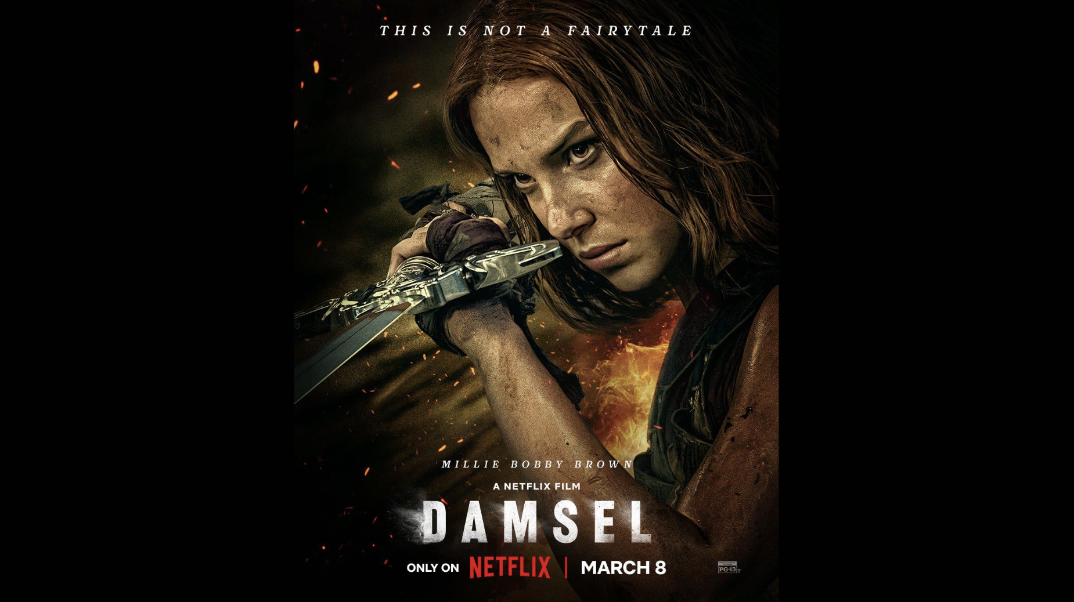Almost all of the classic fairy tales depict defenseless princesses who need a strong man to help them achieve their happily ever after. Although this trope is becoming less exaggerated in recent films, it is still uncommon to find a story focused on a sole independent heroine. Instead, there is often the addition of a male love-interest to tone down the outlandish idea that a woman is so much more than a “damsel in distress.”
Released on Netflix last Friday, Damsel intentionally and powerfully breaks this cliche.
The story centers around a young woman named Eloide (Millie Bobby Brown) who has hesitantly agreed to marry an unknown prince for the sake of her struggling village. After enduring fairly ominous wedding rites, Eloide is thrown by her betrothed into a chasm with the discovery that she is the newest sacrifice to the vengeful dragon that haunts the kingdom. With only her determination and wits to guide her, Eloide must find out if she has what it takes to escape. A bold and gritty fairytale, Damsel gives young women a compelling depiction of female strength and perseverance that flouts the common themes found in media. As always, spoiler alerts coming up!
At first, I was skeptical about the film. As epic as the slogan “this is not a fairytale” may sound, I felt like the plot still seemed too cliche, too much like the classic once-upon-a-time despite claiming to be otherwise. Eloide has a dead mother, a sweet younger sister, a struggling backwater village, and a distant, conceited step-mother (though she is soon brilliantly shown to be otherwise). However, in a way, these cliches only serve to highlight the trope this film is meant to subvert: there is no Prince Charming, and this damsel saves herself.
As the female lead, Millie Bobby Brown spends the majority of her time on set acting by herself. This would be difficult for any actor, yet she does an absolutely phenomenal job, imbuing her character with the confidence, sincerity, and depth that makes Eloide so compelling to watch. Brown stunningly portrays both Eloide’s fear and anger, without diminishing her strength and determination to survive.
The stunts and witty action scenes take center stage in this film. Watching Eloide fight her way through seemingly inescapable situations (that jump across the chasm!?!?!) is jaw-dropping, especially realizing that Brown does all of her own stunts. I was especially impressed with the cinematic feel of both the sheer horror of her sprint through the bird cave and the desperate hope of her climb to the top of the crystals. I liked the way the movie took itself seriously. The details of all of the women who had been sacrificed and lost their lives in that cave are powerful: the maps left behind, the crown Eloide used to climb the crystals, and the names carved into the walls. The idea that she wasn’t the only woman who had made it that far, who had fought and hoped and survived (like Victoria making it to the cliffside), adds to the concept that these sacrifices were real, strong women, not damsels in distress.
The way she outsmarts the dragon (beautifully voiced by Shohreh Aghdashloo) and then chooses to end the cycle of revenge is the perfect choice for Eloide’s story. Although the rest of the ending is a bit dramatic, I loved how it drives home the idea that this story is not about a prince. This story is about a woman. Overall, the plot is a bit simple and overly predictable, yet it was nonetheless entertaining, with the gorgeous Portuguese scenery and gritty action. I would sit down in a heartbeat to watch it again.




































![Teacher Lore: Mr. Hillman [Podcast]](https://bsmknighterrant.org/wp-content/uploads/2025/03/teacherlorelogo-1200x685.png)




